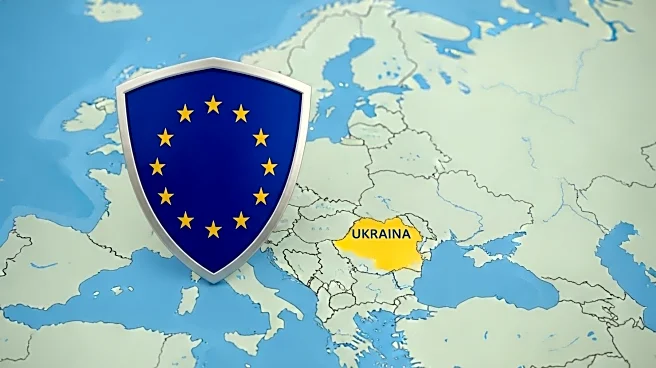What's Happening?
European leaders are actively working on strategies to secure Ukraine in the event of a peace deal, despite ongoing stalled negotiations between Ukraine, the U.S., and the EU. The coalition of the willing, led by France and the U.K., is considering sending European troops to Ukraine post-agreement, with logistical support from the U.S. President Trump has assured European leaders of American assistance, although the planning remains hypothetical due to undefined ceasefire lines and troop deployment specifics. Estonia has expressed readiness to contribute troops immediately after a ceasefire, while other countries remain cautious. French President Emmanuel Macron has scheduled a coalition meeting in Paris to discuss further plans.
Why It's Important?
The security measures being discussed are crucial for ensuring stability in Ukraine and deterring further Russian aggression. The involvement of European troops, backed by U.S. logistical support, could provide a significant deterrent against Russian attacks. This planning highlights the geopolitical importance of Ukraine and the commitment of European nations to support its sovereignty. The potential deployment of troops also underscores the complexity of international military cooperation and the challenges of aligning national interests in a volatile region. The outcome of these discussions could significantly impact European security policy and U.S.-EU relations.
What's Next?
The next steps involve further coalition meetings to refine plans for troop deployment and security guarantees. European leaders are urging President Trump to impose consequences on Russia for continued aggression, potentially through sanctions or other diplomatic measures. The EU is considering a new package of sanctions against Moscow and the possibility of reallocating frozen Russian assets to aid Ukraine's reconstruction. The coalition's ability to mobilize troops and resources will depend on the evolving political and military landscape in Ukraine and Russia's response to international pressure.
Beyond the Headlines
The discussions around securing Ukraine post-peace deal reveal deeper geopolitical tensions and the strategic importance of Eastern Europe in global politics. The potential deployment of European troops raises ethical and legal questions about military intervention and sovereignty. Additionally, the economic implications of reallocating frozen Russian assets could affect international financial systems and diplomatic relations. The situation also highlights the role of the U.S. in European security matters and the influence of President Trump's foreign policy decisions on global stability.










